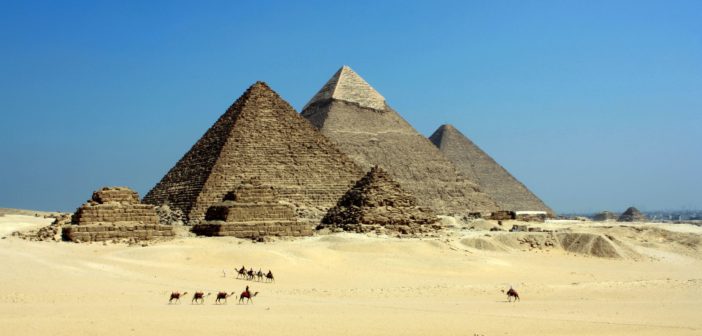By Michael Mooney, Staff Writer
Tensions are running high between the US and Egypt following Washington’s decision to suspend a multi-million dollar deal that provided the Egyptian military with money and occasional supplies. This comes as a result of US dissatisfaction towards the ousting of recently elected President Mohammed Morsi, and the subsequent government crackdown on his Muslim brotherhood.
This event only being the most recent in a series of political/economic struggles for Egypt.
The past few years have yielded much instability for the populous North-African country. Earlier this year, on July 3 the Egyptian military, headed by General Abdul Fatah al-Sisi, ejected President Morsi.
Late in June protestors gathered to voice their discontent for the president’s actions claiming that he was becoming progressively more ignorant of Egyptian law, and that he was trying to pursue a purely Islamic agenda.
Protests turned violent after several protestors were slain. The military joined the protestors in ordering the president to leave. The military went so far as to threaten to forcefully remove Morsi if civilian leadership didn’t do so.
Eventually, the military removed Morsi from office, suspended the Egyptian constitution, and appointed Judge Adly Mansour as the interim president. This caused a second round of protests and clashes to break out between Morsi loyalists and revolutionary supporters.
These clashes are still occurring throughout Egypt, with the death toll hovering around 50.
President Morsi was the first president to be democratically elected following the ousting of President Hosni Mubarak. During the 2012 presidential elections, Morsi became the frontrunner for the Muslim Brotherhood following the disqualification of Khairat El-Shater. After the first round of elections it was reported that Morsi held a 25.5% share of the votes. Following a second run-off vote, Morsi was officially announced as the President of Egypt.
During the early days of his presidency Morsi faced a government still staffed with supporters of former president Hosni Mubarak.
Prior to his voluntary resignation, President Hosni Mubarak had held office for about 30 years. Then Vice President Mubarak entered office after the assassination of President Anwar Sadat. Mubarak was known for his policies of increasing affordable housing and medicine while also being responsible for the imprisonment of citizens without trial and the construction of illegal detention facilities.
Anti-Mubarak sentiments hit a fevered peak in 2011, with millions of Egyptians gathering to protest his regime and demand his resignation. After several attempts to convince the Egyptian people that he would not seek re-election, Mubarak left office, turning power over to the military.
International reaction to the ongoing violence has varied. The United States, a former supporter of the Mubarak Administration, pushed for a peaceful resolution. President Barack Obama stated (in regards to the 2011 uprising)
“What’s needed right now are concrete steps that advance the rights of the Egyptian people…Ultimately the future of Egypt will be determined by the Egyptian people.”
In another speech Obama said,
“All governments must maintain power through consent, not coercion.”
President Obama called on all parties to work towards a peaceful resolution. The United States would call upon the divided Egyptian populace to find a peaceful resolution once more in the 2013 coup. The Russian Federation expressed little opinion on the uprising, except for its hope that Russian citizens in Egypt would be protected. The reaction from Egypt’s neighbors was mixed. Israeli President Shimon Peres stated that
“[Mubarak’s] contribution to peace will never be forgotten. I thank him for saving many people’s lives by preventing war. The biggest problem isn’t changing the government but changing the face of a country as poor as Egypt.”
Peres also went on to voice his lament at the Muslim Brotherhood’s participation in the Egyptian election, fearing that the group would cause radical changes in foreign policy that would negatively affect diplomacy between the two countries. However, due to an order from Prime Minister Benjamin Netanyahu, Israeli officials were prevented from disclosing personal opinion on the 2013 coup, as it was “purely an Egyptian issue.”
Saudi Arabia and the Palestinian Authority, the interim government of the Gaza Strip, were supportive of Mubarak, with King Abdullah Bin Abdul-Aziz stating
“No Arab or Muslim can tolerate any meddling in the security and stability of Arab and Muslim Egypt by those who infiltrated the people in the name of freedom of expression, exploiting it to inject their destructive hatred. As they condemn this, the Kingdom of Saudi Arabia and its people and government declares it stands with all its resources with the government of Egypt and its people.”
The opinion here at the school reflects the general opinion worldwide. Prof. Carozza, a history professor agreed with Washington’s decision, stating
“A sensitive and controversial question, but yes, human rights abuses need to be addressed. The killing of citizens is unacceptable.”
When asked about the recent ejection of Morsi by the military on the grounds of pushing an unconstitutional Islamic agenda, Prof. Carozza said, “I do believe in the separation of church and state, so I cannot agree with the pushing of an Islamic agenda by President Mohamed Morsi.”
“The Constitution of the Arab Republic of Egypt gives freedom of worship to Islam, Judaism, and Christianity, but does not give freedom of worship to all religions. Also, I cannot agree with a military-backed government. The Egyptian military should take steps to return Egypt to a democratically-elected civilian government.”
Like many, Prof. Carozza doesn’t know what the future may hold for Egypt, but hopes for the best from the troubled nation.





